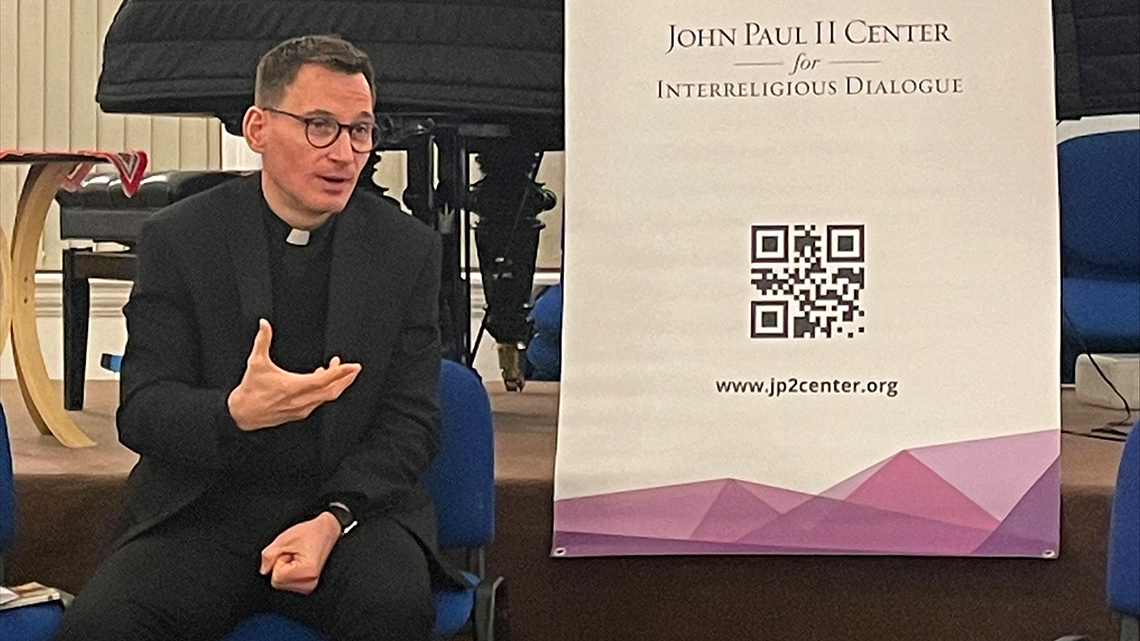Fr Jan Nowotnik, Director of Mission. Credit: CBCEW
Delegates from the Catholic Bishops’ Conference of England and Wales attended an interfaith youth event at the Ukraininan Catholic Cathedral in London on 2 December 2021 to discuss the important role young adults play in constructive Interreligious dialogue.
Fr Jan Nowotnik, Director of Mission, was the event’s keynote speaker, accompanied by Mission Adviser Elliot Vanstone.
Hosted by the John Paul II Center for Interreligious Dialogue, the discussion was moderated by Dr Taras Dzyubanskyy, a theologian and lecturer at the Ukrainian Catholic University (UCU).
When the dialogue began, the delegates covered a wide range of topics from the actual definition of interreligious dialogue and contemporary political affairs – both at home and abroad, to the place of religion in society and the effect of the Covid-19 pandemic on young people.
Keynote Address
In his address, Fr Nowotnik referred to Pope Francis’ encyclical Fratelli Tutti as he emphasised the principle of brother and sisterhood and how we find peace when we work in tandem with one another.
“First we must ask and answer the question: How can I be true to my faith without being false to yours? The great sage Hillel the Elder enjoined us not to judge our fellow human being until you stand in his or her place. One must do something more – to look at yourself with the eyes of the other. With what eyes do you see me?”
He also praised the Russell Berrie Foundation, a grant-making body that funds a Fellowship programme offering international students the chance to study Interreligious Dialogue at the Pontifical University of St Thomas Aquinas – the Angelicum – in Rome.
Dialogue in Digital Spaces
The second part of the event was dedicated to interfaith dialogue in digital spaces such as social media. Four young religious leaders and media makers – Dr Maryyum Mehmood, Sabah Ahmedi, Lauren Keiles, and Atif Rashid – who recently took part in the United Nations Alliance of Civilizations Intercultural Initiative EDIN (Empowering Dialogue and Interfaith Networks) showcased their social media platforms and campaigns.
“We’re looking at working collaboratively with these young religious leaders in the future,” said Elliot Vanstone. “Sabah Ahmedi, the ‘Young Imam’ on social media, is one of the country’s youngest imams and has a very strong social media presence. Hopefully, we can learn a lot from each other moving forward.”
During the day, Bishop Kenneth Nowakowski, the Apostolic Eparch of the Ukrainian Catholic Eparchy of the Holy Family of London, took the attendees on a tour of the Ukrainian Cathedral giving a brief history of the church.
John Paul II Center for Interreligious Dialogue
The John Paul II Center for Interreligious Dialogue, a partnership between The Russell Berrie Foundation and the Pontifical University of St Thomas Aquinas (Angelicum), and administered by the Institute of International Education (IIE), builds bridges between Christian, Jewish and other religious traditions by providing the next generation of religious leaders with a comprehensive understanding of and dedication to interfaith issues and action.
Russel Berrie Foundation
https://www.russellberriefoundation.org/
The Russell Berrie Foundation, through grant making, makes social investments in innovative ideas to empower leaders. One of its funded projects is a fellowship program at the John Paul II Center for Interreligious Dialogue. The Russell Berrie Fellowship supports priests, women religious, and members of the laity for the purpose of studying one full academic year at The Pontifical University of St Thomas Aquinas, also known as the Angelicum, in Rome. Every year it funds ten international students to pursue a Licentiate in Theology or a Doctorate in Theology, as well as a Diploma in Interreligious Studies. The Fellowship Program aims to build bridges between Christian, Jewish, and other religious traditions by providing the next generation of religious leaders with a comprehensive understanding of, and dedication to, interfaith issues.


Source: CBCEW

